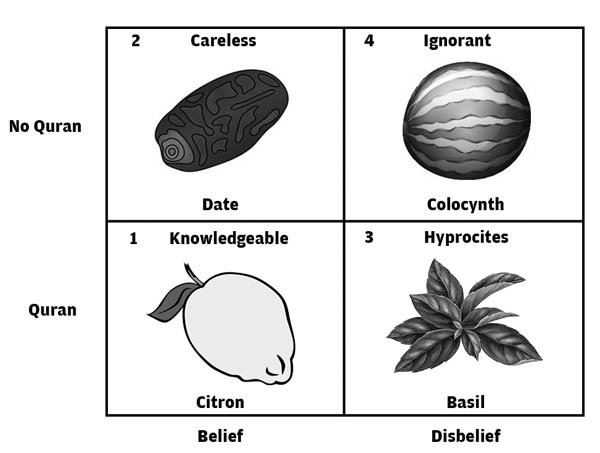Islam is a holistic system that impacts all areas of a person’s life. To this effect, a Muslim should strive to attain a strong body, good character and cultured thought. He should be able to earn a living, have pure belief, and correct worship. He should be able to control his desires, be careful about his time, organised in his affairs, and beneficial to those around him. These comprise the duties of every Muslim as an individual. Thus, Islam offers a theory for the Muslims to follow and explains that people can be categorised in four different ways, with reference to their knowledge about their belief and the Qur’ān.
Prophet Muhammad (peace and blessings of Allah be to him) said, “The similitude of a believer who recites the Qur’ān is like that of a citron (a fruit which looks like a lemon with a thick aromatic rind), whose fragrance is beautiful and whose taste is good. The similitude of a believer who does not recite the Qur’ān is like a date; it tastes good but has no fragrance. The similitude of a disbeliever who recites the Qur’ān is like that of the basil, it has a beautiful fragrance but tastes bitter. The similitude of a disbeliever who does not recite the Qur’ān is like that of the colocynth (also known as the bitter apple), it tastes bitter and has no fragrance….” (Abu Dawood)
The theory demonstrates the high rank of a believer and the loftiness of his deeds and to expose the despicable level of a sinner and the baseness of his deeds. It divides the people into four different categories. The following is the detailed explanation of the four quadrants which are mentioned in the theory:
CITRON – KNOWLEDGEABLE
The people who fall under the first quadrant are those who have belief in Allah, who have knowledge of the Qur’ān and do justice to it. Allah says in the Qur’ān, “Those to whom We have given the Book recite it with a true recital. They (are the ones who) believe in it ….” (Qur’ān 2:121) The verse means that the true believers are the ones who do justice to the Qur’ān; they do justice by reciting it, pondering over it and completely apply its teachings in their lives. This can only be done when one has strong belief in Allah. Thus, they are considered knowledgeable people.
DATE – CARELESS
The people who fall under the second quadrant are those who believe in Allah but fail to do justice with the Qur’ān. Allah the Exalted says in the Qur’ān, “And the Messenger has said, ‘O my Lord, indeed my people have taken this Qur’ān as (a thing) abandoned.” (Qur’ān 25:30) The verse states that people avoid the Qur’ān, they do not listen to it, they do not understand it, they do not live by it and they prefer something else to it. Thus, they are considered careless people.
BASIL – HYPOCRITES
The people who fall under the third quadrant are those who have not believed but have knowledge of the Qur’ān. Allah says in the Qur’ān, “And it has already come down to you in the Book (i.e., the Qur’ān) that when you hear the verses of Allah (recited), they are denied (by them) and ridiculed; so do not sit with them until they enter into another conversation. Indeed, you would then be like them. Indeed, Allah will gather the hypocrites and disbelievers in Hell all together.” (Qur’ān 4:140) The verse states that the Qur’ān has come to the people and they have knowledge of the message of the Qur’ān, but they do not openly declare that they reject the message of the Qur’ān. Thus, they are considered hypocrites.
COLOCYNTH – IGNORANT
The people who fall under the fourth quadrant are those who neither have belief nor do justice to the Qur’ān. Allah says in the Qur’ān, “And those who disbelieve say, “Do not listen to this Qur’ān and speak noisily during (the recitation of) it that perhaps you will overcome.” (Qur’ān 41:26) The verse speaks about three important things: first, the disbelievers tell others not to listen to the Qur’ān, secondly, they make noise when the Qur’ān is recited so that the message does not reach them and thirdly, they also do not listen to the message of the Qur’ān. Thus, they are considered people with ignorance.
The fourth quadrant is considered to be the most negative quadrant and the first quadrant is considered to be the most positive quadrant. However, the first two categories are fortunate ones as they are believers and the latter two categories are the wretched ones. In order to develop a great personality one should strive to move from the fourth quadrant to the first quadrant. If the person is in the first quadrant, he is considered to be close to Allah and the Qur’ān and if the person is in the fourth quadrant, then he is considered to be away from Allah and the Qur’ān.
Belief in Allah and the Qur’ān are two sources of light which Allah places in whoever’s heart He wills. They are both the basis of every good in this world and in the hereafter. Belief in Allah and the Qur’ān moves people out of darkness and brings them to light. Knowledge thereof is the best and the most virtuous. In fact, there is no knowledge that can really benefit a person besides the knowledge of Qur’ān and belief.


